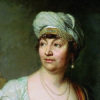Madame de Stael

Madame de Stael
Anne Louise Germaine de Staël-Holstein, commonly known as Madame de Staël, was a French woman of letters of Swiss origin whose lifetime overlapped with the events of the French Revolution and the Napoleonic era. She was one of Napoleon's principal opponents. Celebrated for her conversational eloquence, she participated actively in the political and intellectual life of her times. Her works, both critical and fictional, made their mark on the history of European Romanticism...
NationalityFrench
ProfessionWriter
Date of Birth22 April 1766
CountryFrance
Love is the emplem of eternity; it confounds all notions of time; effaces all memory of begining, all fear of an end.
We understand death for the first time when he puts his hand upon one whom we love
Prayer is more than meditation. In meditation, the source of strength is one's self. When one prays, he goes to a source of strength greater than his own.
Wit consists in knowing the resemblance of things that differ, and the difference of things that are alike.
When a noble life has prepared for old age, it is not decline that it reveals, but the first days of immortality.
[Moralistic] novels are at the same disadvantage as teachers: children never believe them, because they make everything that happens relate to the lesson at hand.
How true it is that, sooner or later, the' most rebellious must bow beneath the yoke of misfortune!
Love is the history of a woman's life; it is an episode in man's. [Fr., L'amour est l'histoire de la vie des femmes; c'est un episode dans celle des hommes.]
Men have made of fortune an all-powerful goddess, in order that she may be made responsible for all their blunder's.
The only equitable manner in my opinion, of judging the character of a man is to examine if there are personal calculations in his conduct; if there are not, we may blame his manner of judging, but we are not the less bound to esteem him.
Strangers are contemporary posterity. [Fr., Les etrangers sont la posterite contemporaine.]
Mystery such as is given of God is beyond the power of human penetration, yet not in opposition to it.
Tombs decked by the arts can scarcely represent death as a formidable enemy; we do not, indeed, like the ancients, carve sports and dances in the sarcophagus, but thought is diverted from the bier by works that tell of immortality, even from the altar of death.
Glory can be for a woman but the brilliant morning of happiness.